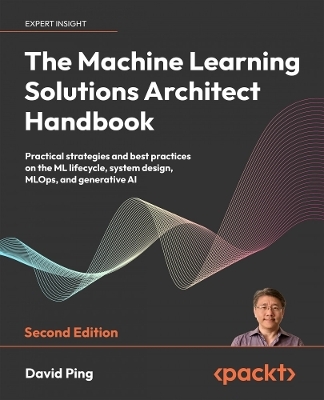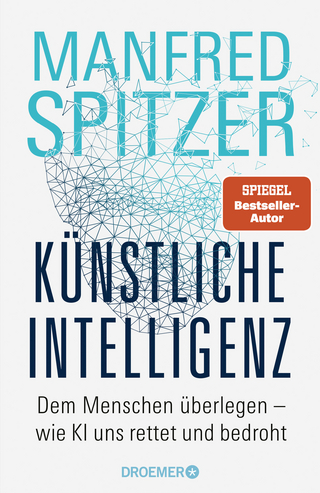
The Machine Learning Solutions Architect Handbook
Packt Publishing Limited (Verlag)
978-1-80512-250-0 (ISBN)
Purchase of the print or Kindle book includes a free PDF eBook
Key Features
Go in-depth into the ML lifecycle, from ideation and data management to deployment and scaling
Apply risk management techniques in the ML lifecycle and design architectural patterns for various ML platforms and solutions
Understand the generative AI lifecycle, its core technologies, and implementation risks
Book DescriptionDavid Ping, Head of GenAI and ML Solution Architecture for global industries at AWS, provides expert insights and practical examples to help you become a proficient ML solutions architect, linking technical architecture to business-related skills.
You'll learn about ML algorithms, cloud infrastructure, system design, MLOps , and how to apply ML to solve real-world business problems. David explains the generative AI project lifecycle and examines Retrieval Augmented Generation (RAG), an effective architecture pattern for generative AI applications. You’ll also learn about open-source technologies, such as Kubernetes/Kubeflow, for building a data science environment and ML pipelines before building an enterprise ML architecture using AWS. As well as ML risk management and the different stages of AI/ML adoption, the biggest new addition to the handbook is the deep exploration of generative AI.
By the end of this book , you’ll have gained a comprehensive understanding of AI/ML across all key aspects, including business use cases, data science, real-world solution architecture, risk management, and governance. You’ll possess the skills to design and construct ML solutions that effectively cater to common use cases and follow established ML architecture patterns, enabling you to excel as a true professional in the field.What you will learn
Apply ML methodologies to solve business problems across industries
Design a practical enterprise ML platform architecture
Gain an understanding of AI risk management frameworks and techniques
Build an end-to-end data management architecture using AWS
Train large-scale ML models and optimize model inference latency
Create a business application using artificial intelligence services and custom models
Dive into generative AI with use cases, architecture patterns, and RAG
Who this book is forThis book is for solutions architects working on ML projects, ML engineers transitioning to ML solution architect roles, and MLOps engineers. Additionally, data scientists and analysts who want to enhance their practical knowledge of ML systems engineering, as well as AI/ML product managers and risk officers who want to gain an understanding of ML solutions and AI risk management, will also find this book useful. A basic knowledge of Python, AWS, linear algebra, probability, and cloud infrastructure is required before you get started with this handbook.
David Ping is an accomplished author and industry expert with over 28 years of experience in the field of data science and technology. He currently serves as the leader of a team of highly skilled data scientists and AI/ML solutions architects at AWS. In this role, he assists organizations worldwide in designing and implementing impactful AI/ML solutions to drive business success. David's extensive expertise spans a range of technical domains, including data science, ML solution and platform design, data management, AI risk, and AI governance. Prior to joining AWS, David held positions in renowned organizations such as JPMorgan, Credit Suisse, and Intel Corporation, where he contributed to the advancements of science and technology through engineering and leadership roles. With his wealth of experience and diverse skill set, David brings a unique perspective and invaluable insights to the field of AI/ML.
Table of Contents
Navigating the ML Lifecycle with ML Solutions Architecture
Exploring ML Business Use Cases
Exploring ML Algorithms
Data Management for ML
Exploring Open-Source ML Libraries
Kubernetes Container Orchestration Infrastructure Management
Open-Source ML Platforms
Building a Data Science Environment using AWS ML Services
Designing an Enterprise ML Architecture with AWS ML Services
Advanced ML Engineering
Building ML Solutions with AWS AI Services
AI Risk Management
Bias, Explainability, Privacy, and Adversarial Attacks
Charting the Course of Your ML Journey
Navigating the Generative AI Project Lifecycle
Designing Generative AI Platforms and Solutions
| Erscheinungsdatum | 01.08.2023 |
|---|---|
| Verlagsort | Birmingham |
| Sprache | englisch |
| Maße | 191 x 235 mm |
| Themenwelt | Mathematik / Informatik ► Informatik ► Netzwerke |
| Informatik ► Theorie / Studium ► Künstliche Intelligenz / Robotik | |
| ISBN-10 | 1-80512-250-9 / 1805122509 |
| ISBN-13 | 978-1-80512-250-0 / 9781805122500 |
| Zustand | Neuware |
| Haben Sie eine Frage zum Produkt? |
aus dem Bereich


